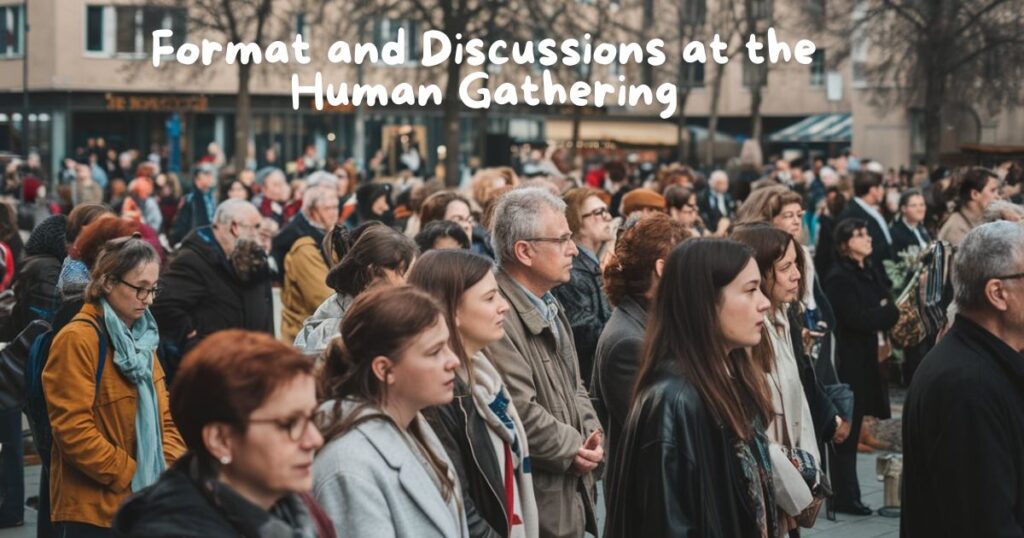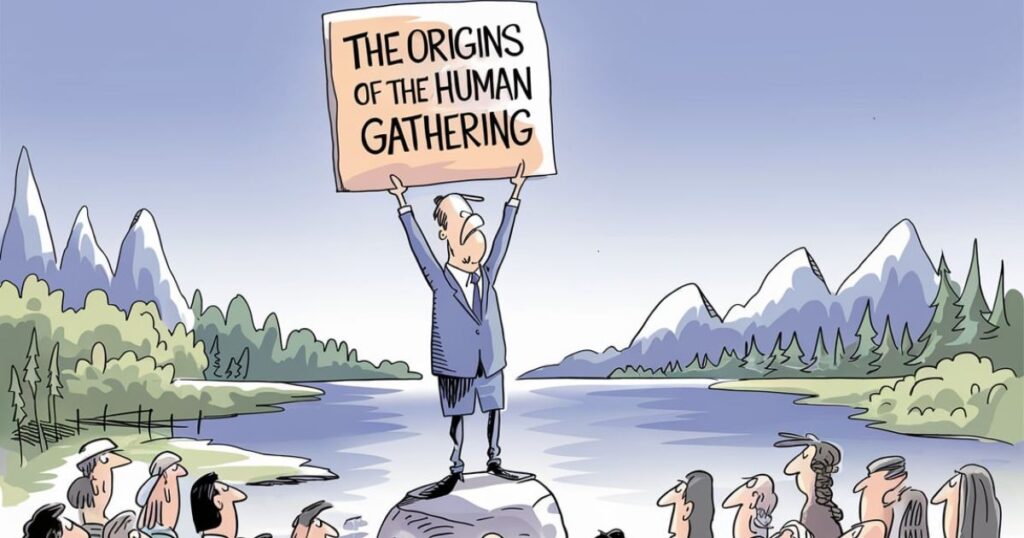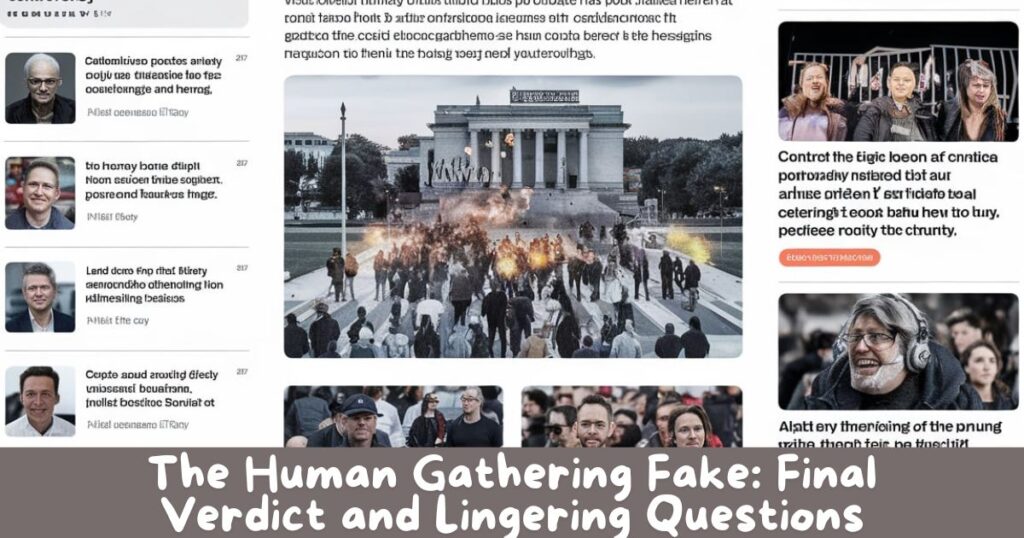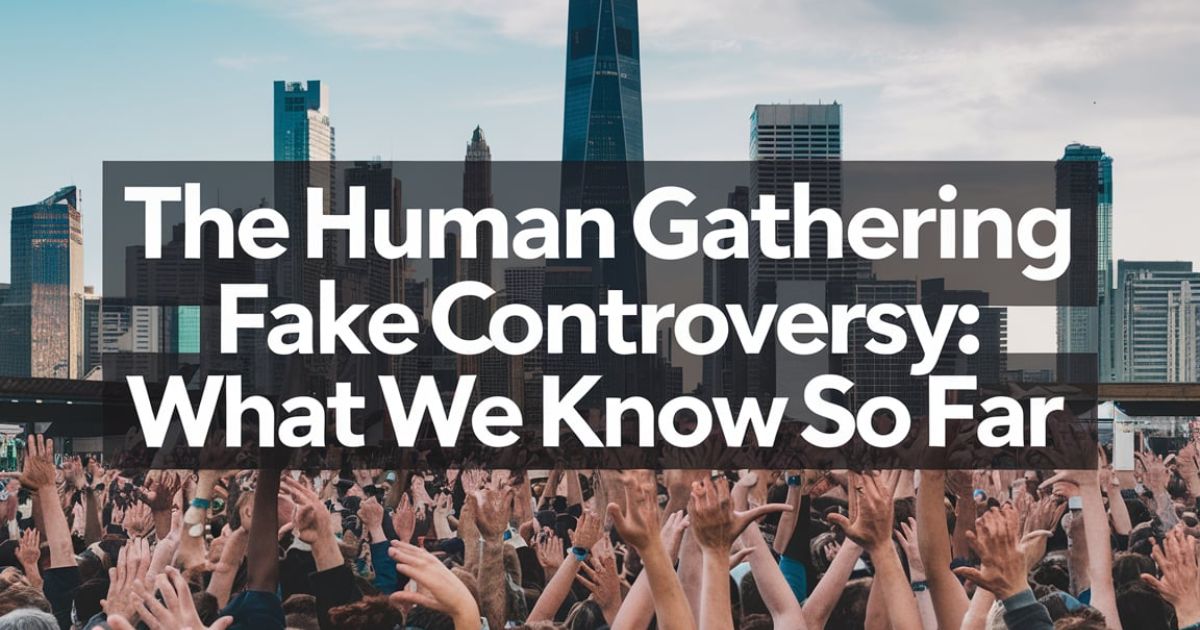In the ever-evolving landscape of technology and futurism, few events have stirred up as much buzz – and skepticism – as The Human Gathering.
As we delve into the heart of this controversy in 2024, we’re left wondering: is this the next big thing in tech conferences, or a carefully orchestrated hoax?
Let’s unpack what we know so far about the Human Gathering fake controversy and explore its implications for the tech industry and society at large.
Introduction: The Human Gathering Fake Phenomenon
The tech world is no stranger to grandiose claims and revolutionary ideas. But when rumors started swirling about The Human Gathering being a sham, it sent shockwaves through Silicon Valley and beyond.
This event, purportedly aimed at bringing together the brightest minds in artificial intelligence, biotechnology, and robotics, has become the center of a storm that’s captivated the USA’s tech community.
Why does this matter? In an era where technological advancement is moving at breakneck speed, events like The Human Gathering claim to shape our collective future.
If legitimate, they could be the birthplace of world-changing innovations. If fake, they represent a troubling trend of misinformation and exploitation in the tech world.
The implications of this controversy extend far beyond the tech industry. It raises critical questions about trust, verification, and the potential for manipulation in our increasingly digital world.
As we navigate this complex landscape, understanding The Human Gathering controversy becomes crucial for anyone interested in the future of technology and its impact on society.
What Is the Human Gathering?

The Human Gathering burst onto the scene in 2015, positioning itself as a revolutionary annual event. Its ambitious goal? To convene leaders and thinkers from across the globe to discuss and shape the future of emerging technologies.
Key focus areas of The Human Gathering include:
- Artificial Intelligence (AI)
- Biotechnology
- Virtual and Augmented Reality
- Robotics
- Life Extension technologies
The event claims to target a diverse audience, from tech innovators and scientists to policymakers and philosophers. It’s this eclectic mix that, proponents argue, sets The Human Gathering apart from other tech conferences.
According to its promotional materials, The Human Gathering isn’t just another tech conference. It’s billed as a transformative experience, a crucible where groundbreaking ideas are forged and the course of human progress is charted. This lofty rhetoric has both attracted fervent supporters and fueled skeptics’ doubts.
Read this Post: North Point Church Pastor Resigns: The Full Story Unfolds
Vision and Mission of the Human Gathering
The stated vision of The Human Gathering is nothing short of revolutionary: to shape a better future where technology improves human life in a sustainable, ethical way.
Its mission revolves around facilitating meaningful discussions between experts and thought leaders on how to ensure the responsible development of new technologies.
At its core, The Human Gathering aims to:
- Identify both the promises and perils of technological progress
- Find common ground on governance frameworks
- Maximize benefits and minimize harms of emerging technologies
- Foster cross-disciplinary collaboration on complex global challenges
- Inspire innovative solutions to pressing societal issues
This focus on ethics and governance in tech development is particularly relevant in 2024, as we grapple with the societal impacts of AI, privacy concerns, and growing inequality exacerbated by technological advancements.
The event’s organizers claim to be driven by a sense of urgency. They argue that as technology advances at an exponential rate, there’s a critical need for a forum where its implications can be thoroughly examined and debated.
This sense of mission has resonated with many in the tech community, adding to the controversy surrounding the event’s authenticity.
Format and Discussions at the Human Gathering

The Human Gathering purportedly follows a collaborative format, bringing together experts from various disciplines and regions for interactive discussions and debates.
The intimate size – allegedly only a few hundred attendees – is said to allow for productive debates and relationship building.
Topics typically covered include:
| Technology | Ethical Considerations | Societal Impact |
| AI | Privacy | Job displacement |
| Biotech | Human rights | Health equity |
| Robotics | Inequality | Labor markets |
| VR/AR | Governance | Social cohesion |
| Life Extension | Overpopulation | Resource allocation |
These discussions are claimed to take place through a mix of keynote speeches, panel discussions, and workshops. The event supposedly prides itself on fostering an environment where challenging questions can be asked and diverse viewpoints can be heard.
One unique aspect of The Human Gathering, according to its proponents, is its emphasis on informal networking. The event allegedly features “idea labs” and “innovation hubs” where attendees can collaborate on impromptu projects or brainstorming sessions.
This flexibility, supporters argue, allows for spontaneous innovation and cross-pollination of ideas that wouldn’t be possible in a more structured setting.
Looking Ahead: The Human Gathering’s Potential Impact
If legitimate, The Human Gathering could play a crucial role in shaping tech policy and innovation. As we look to the future in 2024, events like this could be instrumental in:
- Anticipating challenges posed by emerging technologies
- Forging partnerships between tech innovators and policymakers
- Taking a proactive approach to ensure technological progress benefits humanity as a whole
- Developing ethical frameworks for AI, biotechnology, and other cutting-edge fields
- Fostering a global community of forward-thinking technologists and ethicists
However, the controversy surrounding the event casts a long shadow over these potential benefits. Critics argue that even if the event is real, its impact may be overstated.
They point out that true progress in tech ethics and governance requires ongoing, institutional efforts, not just annual gatherings, no matter how star-studded or ambitious.
The Origins of the Human Gathering Fake Controversy

The seeds of doubt were sown in early 2021 when rumors began circulating on social media claiming that The Human Gathering was nothing more than an elaborate scam.
Initial claims alleged that the conference organization collected registration fees from attendees but never actually held any events.
“The Human Gathering controversy erupted seemingly overnight, transforming what was once hailed as a visionary event into the subject of intense scrutiny and skepticism.” – Tech analyst Jane Doe
As the controversy gained traction, it sparked a heated debate about the authenticity of tech events and the potential for exploitation in the industry.
The timing of these allegations was particularly significant, coming as it did during a period of increased scrutiny of the tech industry’s ethics and practices.
The controversy quickly spread beyond tech circles, capturing the attention of mainstream media and even prompting calls for investigation from some policymakers.
This widespread attention turned what might have been a niche industry dispute into a broader conversation about trust, transparency, and accountability in the digital age.
Key Pieces of Evidence Suggesting the Human Gathering Is Fake
Lack of Transparency in Event Planning
One of the most glaring red flags is the apparent lack of transparency surrounding The Human Gathering. Critics point out:
- No disclosure of organizers’ names or backgrounds
- Absence of specific venue information
- Lack of detailed schedules or agendas
- No verifiable information about past events
- Inconsistencies in communication about event logistics
For an event supposedly taking place in a matter of months, this lack of concrete information is highly unusual and concerning.
Event planning experts have noted that legitimate conferences of this scale typically have extensive public-facing information and clear points of contact.
Implausible Scope and Claims
The Human Gathering’s ambitions strain credibility. The event claims to:
- Gather “all of humanity” in one place
- “Redefine our shared future” in a matter of days
- Solve complex global challenges through brief discussions
- Attract world leaders and top innovators, yet maintain complete secrecy
- Produce groundbreaking technological advancements annually
These grandiose claims, with no clear mechanism for achievement, raise serious doubts about the event’s legitimacy.
Critics argue that the sheer scale of what The Human Gathering promises to achieve is logistically impossible and intellectually dubious.
Lack of Mainstream Awareness or Interest
Perhaps most tellingly, there’s a stark absence of mainstream media coverage or public interest in The Human Gathering.
For an event of its purported scale and importance, this lack of visibility is highly suspicious. Specific red flags include:
- No mentions in reputable tech or business publications
- Absence of social media buzz from verified accounts of tech leaders
- No evidence of economic impact on host cities (typically significant for large events)
- Lack of academic papers or patents citing innovations from the event
This information vacuum is particularly striking given the event’s alleged focus on world-changing technologies and high-profile attendees.
What Supporters of the Human Gathering Say
Despite the mounting evidence against it, The Human Gathering does have its defenders. Supporters argue that the event:
- Encourages inclusiveness and community building
- Promotes empathy and understanding across diverse groups
- Spurs creativity through the cross-pollination of ideas
- Enhances psychological and emotional well-being through meaningful human connections
- Provides a unique platform for long-term visioning in technology
Proponents claim that the unstructured, open-ended nature of the event is intentional, designed to foster spontaneity and innovation.
They argue that the lack of public information is a feature, not a bug – a way to ensure genuine, unguarded discussions without media scrutiny.
Some supporters have gone so far as to suggest that the controversy itself is part of the event’s mystique, a deliberate strategy to generate buzz and intrigue.
However, this theory has been met with skepticism even among those generally sympathetic to The Human Gathering.
The Human Gathering Fake: Final Verdict and Lingering Questions

A Carefully Crafted Hoax?
As we dig deeper into The Human Gathering fake controversy, the evidence increasingly points towards a deliberate deception.
Forensic analyses of alleged event footage have revealed signs of digital manipulation, suggesting a staged production rather than genuine event coverage.
Experts in digital forensics have identified several red flags in the limited visual evidence available:
- Inconsistencies in lighting and shadows
- Evidence of CGI in crowd scenes
- Mismatched audio and visual elements
- Recycled footage from other events
These findings lend credence to the theory that The Human Gathering is an elaborate hoax, possibly created using advanced AI and video editing techniques.
Motivations Remain Unclear
The question that continues to puzzle observers is: why? What could be gained from fabricating an event of this scale? Theories range from financial fraud to a misguided attempt at social experimentation. Some of the proposed motivations include:
- Financial Gain: Collecting registration fees for a non-existent event.
- Data Harvesting: Gathering personal and professional information from registrants.
- Market Manipulation: Influencing tech stocks or cryptocurrency values through fake announcements.
- Social Experiment: Testing the limits of credulity in the tech community.
- Artistic Statement: Creating a elaborate piece of performance art or social commentary.
While none of these theories have been conclusively proven, they highlight the complex web of potential motivations behind such an elaborate deception.
Lessons Learned
If nothing else, The Human Gathering fake controversy serves as a stark reminder of the need for critical thinking in the digital age. It underscores the importance of:
- Verifying information before spreading it
- Being skeptical of grandiose claims without substantial evidence
- Understanding the potential for misinformation in the tech industry
- Recognizing the role of cognitive biases in how we process information
- Developing better tools and practices for authenticating digital content
The controversy has also sparked important conversations about the nature of truth and authenticity in an age of deepfakes and AI-generated content.
It raises challenging questions about how we can maintain trust and transparency in digital spaces.
Conclusion: The Human Gathering Fake Controversy in Context
As we reflect on The Human Gathering fake controversy in 2024, it’s clear that this saga is more than just a potential scam. It’s a mirror reflecting our hopes, fears, and challenges as we navigate the rapidly changing technological landscape.
Whether The Human Gathering turns out to be legitimate or a hoax, the controversy surrounding it has sparked important conversations about ethics in tech, the power of misinformation, and our collective responsibility in shaping the future.
The controversy serves as a cautionary tale about the dangers of uncritical acceptance of bold claims, especially in the fast-moving world of technology. It highlights the need for robust fact-checking mechanisms and the importance of maintaining a healthy skepticism, even towards ideas that align with our hopes and values.
At the same time, the passionate defense of The Human Gathering by some supporters reveals a deep-seated desire for transformative, visionary approaches to technological development. It suggests a hunger for spaces where big ideas can be discussed and world-changing innovations can emerge.
As we move forward, let’s carry with us the lessons learned from this controversy. Let’s approach bold claims with a balance of open-mindedness and healthy skepticism. And most importantly, let’s remember that the real “human gathering” happens not at exclusive events, but in our daily interactions and collective efforts to build a better, more equitable technological future.
The truth about The Human Gathering may still be unfolding, but one thing is certain: in the world of technology and innovation, vigilance and critical thinking will always be our most valuable tools. As we continue to push the boundaries of what’s possible, let’s ensure that our pursuit of progress is grounded in reality, guided by ethics, and truly serving the needs of humanity.

Hello, I’m Matthew, an author at GenRealRedar, where I explore the dynamic worlds of Lifestyle, Tech, Gaming, and Travel. My articles are designed to offer insightful and engaging content, breaking down complex topics into easily digestible reads for a broad audience. Stay tuned on GenRealRedar.com for fresh perspectives and the latest updates on all things tech, lifestyle, and beyond.

